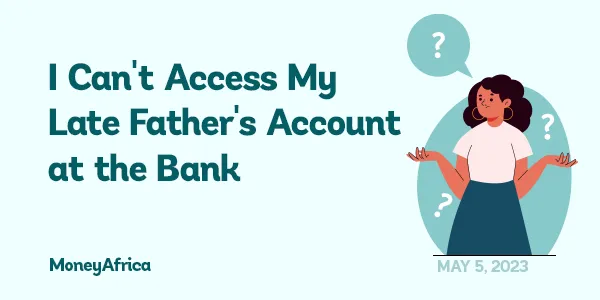Good Morning 😃
How is your week going so far?
Friday letters are usually dedicated to taking questions from our community. Do you have a question for us? Please feel free to
- send an e-mail to info@themoneyafrica.com; or
- send a DM to any of our social media channels, or
- simply fill out this form. Don’t worry, your responses are kept anonymous.
***
Question
A friend of mine who is a banker advised me recently to register my business with CAC and get a corporate account with his bank. He told me a few benefits of having one but I’m not very convinced. I run a small wholesale trading venture worth a little more than N10 million. Will opening such an account be beneficial to me?
Answer
I agree with the advice to have your business registered with the CAC because it helps in showing the business’s authenticity, it helps to build a good reputation and legal recognition.
In addition, applying for a loan with a registered business is simpler than applying for one with a personal name. Any business needs funding, and when it’s necessary to obtain it externally, particularly from banks, your legal business documents make the process easier. This is so that your business is tracked and kept as a separate legal entity. This establishes confidence and conveys credibility.
There are lots of benefits that come with getting your business registered such as:
- If you want to travel for business, it’s easier to get a visa.
- It ensures your company remains relevant in the eyes of the Corporate Affairs Commission (CAC)
- It assures potential clients that they are working with a reliable company.
- It gives the company owner an advantage over rivals who have not registered their business, and many others.
Registering your business is very important because it is necessary to obtain a registration certificate, which grants you the legal right to operate a business and receive all the benefits and rights provided for corporations in Nigeria.
Now, to the issue of opening a corporate account. When a potential customer wants to pay for a service rendered or a product bought, if the name attached to the account is a personal name and not the name of the company, most people would be skeptical. This is because the receipt that would be generated from that transaction would not show that payment was made to the company but to a personal account, and it might be hard to make any reconciliation if the need arises.
A corporate account just shows your clients and partners that you’re serious with the business and you’re treating the business as a separate entity from you. There are various reasons why you should open one for your business:
- The Separation of personal finances from business finances: Having a corporate bank account provides a crucial benefit of separating personal finances from business finances. Separating personal and business transactions simplifies financial management and provides a transparent view of your business’s financial well-being. Additionally, it simplifies the process of preparing financial statements and tax filings as all business transactions can be easily located in one place.
- Improved trust and professionalism: Opening a corporate bank account can enhance trust and professionalism in your business by demonstrating that you are committed to meeting your financial obligations and running a well-organised business. This is particularly significant when interacting with clients, vendors, and other business associates, as they are more inclined to engage with a financially secure and well-organised company.
- You need a business account to create a partnership or corporation: If you eventually decide to form a partnership, someone else other than you will have access to your business finances and a personal bank account cannot be used for this purpose. Therefore, it is essential to have a business bank account to avoid giving your partner access to your personal finances.
However, you have to carefully look through the benefits that your friend’s bank gives to small businesses and then compare with the benefits of other banks. Here are four factors you should consider in your comparison:
- Products and services that fit your needs.
- Interest rates.
- Convenient access to your cash.
- Bank fees/charges.
It is also important to note that opening a corporate account in Nigeria has tax implications, as all companies are required to comply with tax regulations set by the Federal Inland Revenue Service (FIRS). Here are some tax implications you should consider when opening a corporate account in Nigeria:
- Corporate Income Tax (CIT): Companies operating in Nigeria are required to pay CIT on their profits earned in Nigeria. The current CIT rate for large businesses is 30%. For companies with gross turnover greater than N25 million and less than N100 million, the rate is 20%.
- Value Added Tax (VAT): VAT is charged on goods and services sold in Nigeria. All companies registered for VAT in Nigeria are required to charge and remit VAT to the FIRS. The current VAT rate in Nigeria is 7.5%.
- Withholding Tax (WHT): Withholding Tax (WHT) is a method used to collect income tax in advance. WHT is deducted at varying rates ranging from 5% to 10% depending on the transaction. The due date for filing WHT returns is the 21st of every succeeding month.
- Stamp duty: Stamp duty is a tax charged on legal documents such as agreements, leases, and receipts. Companies are required to pay stamp duty on such documents.
***
Question
How can my family gain access to my late father’s account where his dividends are dropping, given that he never had a Will before he passed away and the bank has denied us access to the account? Additionally, what are our options for the shares he owned? Can we sell them or is there another course of action we should take?
Answer
I’m sorry for your loss. When someone passes away without a will, it is called intestacy. In Nigeria, the laws regarding intestacy are governed by the Succession Law of the State where the deceased person resided. The law governing succession in Nigeria is generally headed under two headings: testate and intestate successions. Testate succession is primarily governed by wills and the applicable wills law. Intestate succession on the other hand occurs when an individual dies without leaving behind a valid will.
For estates (i.e. possessions) where the deceased has no will, the estate of the deceased is vested in the Chief Judge of the state where the deceased was domiciled during his/her lifetime through a process called intestate succession. A letter of Administration must be obtained before anyone can assume control over the estate of the deceased.
Letters of Administration are obtained from the probate registry of the High Court before one can be appointed administrator of the deceased estate. An estate administrator is the appointed legal representative of the deceased. The legal representative may be a surviving spouse or any other family member. Their responsibility involves reaching out to family members, settling outstanding debts, and dividing assets in accordance with either the will of the deceased or the intestacy laws of the state.
It is advisable to consult a lawyer to ensure that you are following the correct legal procedures.
Regarding your father’s account, to gain access to your late father’s account, you will need to obtain a court order from the probate court. Probate is the legal right to deal with someone’s property, money, and possessions (their ‘estate’) when they die. You will need to provide proof of your relationship to your father and demonstrate that you are entitled to a share of his assets according to the laws of intestacy in your State. It’s advisable to engage the services of a lawyer who is knowledgeable about probate and estate administration in Nigeria to help you with the process.
As for the shares your father owned, you will need to determine their value and how they should be distributed according to the laws of intestacy in your State. Once you have determined how the shares should be distributed, you may be able to sell them. However, there may be restrictions on selling shares depending on the company and the type of shares your father owned. You may also want to consult with a stockbroker to provide guidance on the process for selling shares.
***
Would you like to know the state of your finances?
Take this test to see how you are doing financially
***
MoneyAfrica premium plan
Are you a mid to high-income earner? Do you find communities a bit too busy? You should sign up for our premium plan.
You can learn more about that here
Thank you for reading Money Africa’s Blog.
Please feel free to share it.
MoneyAfrica premium plan
Are you a mid to high-income earner? Do you find communities a bit too busy? You should sign up for our premium plan.

You can learn more about that here.
***
We often get questions regarding how to plan your finances to align with your relocation plans, especially for students seeking to further their studies. As always, we have heard you, and we have put together an e-book to help you navigate this. Follow this link, to get your FREE copy of the e-book: The Japa Encyclopedia.
***
Get our annual subscription and learn more about investing safely and building a solid portfolio in 2023.
Don’t forget to:
- Join our community, if you want to smash your 2023 financial goals. It takes at least 30 days to build great habits that will last you a lifetime. So why not start now? There is a lot you can achieve.
- If you would like to document your financial journey in 2023, then our journal would be an excellent fit for you. It costs ₦7,500 (excluding delivery).
- Get a budget sheet to track your monthly expenses. Click here
- Get an investment tracker to be on top of all your investments. Click here
MoneyAfrica is a financial literacy platform. Our goal is to make everyone better with their finances.
We do this by engagements via our:
– social media handles
– platforms for paid community members (for adults and students)
– webinar sessions with corporate clients
Would you like to join any of the communities? Please click here
Would you like us to hold a webinar for your company’s staff? Please send an email to info@themoneyafrica.com


